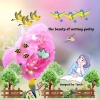In the context of social media, people can experience FOMO when they see posts about friends and acquaintances' parties, trips, achievements, and other positive events. Fear of being left out influences behavior and may cause us to attend events, make impulsive decisions, or stay connected to social media to avoid feeling left out. In today's digital age, fear of missing out (FOMO) has become a pervasive phenomenon, especially among younger generations. Various factors that cause FOMO to become more common among young people:
- The Influence of Social Media
One of the main reasons for the increase in FOMO among young people is the pervasive influence of social media. Platforms like Instagram, Snapchat, and Facebook present a curated version of people's lives, often focusing on exciting events, travel, and social gatherings. Constant exposure to these carefully selected images can make young people feel like they are missing out on valuable experiences.
- Comparison with peers
Young people are at a period in their lives when identity formation and relationships with peers are crucial. Constantly comparing yourself to your peers, both in real life and on social media, can increase your fear of missing out. The desire to fit in and be part of a social circle can increase feelings of inadequacy when one realizes that one is not participating in the shared experience.
- Connectivity through technology
Thanks to the proliferation of smartphones and instant communication, young people are more connected than ever before. The rapid exchange of real-time updates and a constant flow of notifications creates an environment where individuals feel pressured to stay engaged so as not to miss the latest news, trends, and events.
- Cultural Expectations
Social expectations and cultural norms also come into play. Teens often feel obligated to achieve certain milestones or participate in certain activities that are considered socially acceptable. Failure to do so can create a sense that society's expectations are not being met, reinforcing the overall feeling of FOMO.
- Limited life experience
Young people may have more limited life experience than older age groups. As a result, fears of missing out on various aspects of life, such as career opportunities, travel, and relationships, can become more pronounced. A sense of urgency to gain experience can lead to increased FOMO.
- The Impact of Marketing and Advertising
Marketing strategies often target young audiences and create a sense of urgency and exclusivity around a product, event, or experience. Fear of missing out on limited-time sales or trending products can lead to impulsive behavior and contribute to overall FOMO feelings.
- Stage of Development
Psychologically speaking, young people are in a stage of exploration and self-discovery. Fear of missing out is closely related to the desire for novelty and variety, which are hallmarks of this developmental stage. Pursuing diverse experiences can increase the fear of missing out on exciting opportunities.
Fear of missing out is a complex psychological phenomenon that finds fertile ground among adolescents due to a combination of social, technological, and developmental factors. Recognizing and dealing with FOMO requires a nuanced understanding of these influences and developing a sense of self-worth and contentment that goes beyond external validation.
Promoting balanced use of social media, encouraging mindfulness, and emphasizing the value of personal experience can help reduce the impact of FOMO on younger generations.











